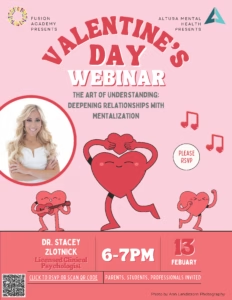
Upcoming Webinar: Valentine’s Day Webinar on Deepening Relationships
Join Altura Mental Health and Fusion Academy on February 13, 2025, for a webinar to deepen relationships through mentalization skills with Dr. Stacey Zlotnick.
Art Therapy
Music Therapy

Both art and music therapy create a sanctuary of safety and acceptance where self-expression flourishes.
You don’t need to be a virtuoso artist or a musical prodigy to benefit. It’s about the liberating process of creation and exploration, not the pursuit of perfection. Our compassionate therapists are skilled guides, trained to accompany you on this transformative journey, helping you connect with your authentic self, navigate the currents of your emotions, and compose a life filled with harmony and well-being.
Reduced Anxiety and Depression (Adults)
Enhanced Cognitive Function (Older Adults)
Increased Self-Esteem (All Ages)
Improved Trauma Recovery
DescriptionIncreased Self-Esteem (All Ages)
Improved Communication and Social Skills (Adolescents & Teens)
At Altura Mental Health, we understand the unique challenges that life can bring, whether you’re a teen grappling with social pressures, a young adult navigating career stress, or an older adult coping with life transitions. Our art and music therapy programs are designed to offer solace and support for a wide array of mental health conditions, empowering you to find your voice, express your emotions, and embark on a journey of healing.
These creative therapies have shown to be beneficial for individuals struggling with:
Recovery from addiction is a journey of self-discovery, and art and music therapy can be powerful companions along the way. Creative expression allows you to explore your inner world, connect with your emotions, and build healthy coping mechanisms to replace self-destructive behaviors.

Join Altura Mental Health and Fusion Academy on February 13, 2025, for a webinar to deepen relationships through mentalization skills with Dr. Stacey Zlotnick.

Parenting is one of life’s greatest joys and challenges, shaping your child’s emotional well-being and capacity for healthy relationships. This comprehensive guide offers proven strategies

Discover the healing power of group therapy at Altura Mental Health. Join us for understanding, growth, and lasting change. Explore our evidence-based programs for support
Take the first step toward a healthier, more fulfilling life today.
Call us at (619) 350-0077 to connect with compassionate experts who are here to provide the personalized care and support you deserve.
At Altura, we’re ready to help you overcome challenges and embrace a brighter, more hopeful future.
At Altura Mental Health, we strive to create a warm and inviting atmosphere where you feel safe to express yourself authentically. When you enter our art and music therapy studios, you’ll be greeted by a calming and inspiring environment, filled with natural light, comfortable seating, and an array of art and music materials.
During your sessions, you can expect:
Through creative exploration, you’ll gain new insights into your thoughts, feelings, and behaviors, fostering personal growth and healing.
Your therapist may also incorporate other therapeutic techniques, such as mindfulness exercises, relaxation techniques, or cognitive-behavioral therapy (CBT), to enhance the effectiveness of the art and music therapy sessions.
Remember, the focus is not on artistic talent or musical ability, but on the process of self-expression and exploration. Our goal is to provide a safe and supportive environment where you can connect with your inner self, process emotions, and develop healthy coping mechanisms.
At Altura Mental Health, we understand that healing is a journey, not a destination. Our therapists will work with you to develop a personalized treatment plan that aligns with your individual needs and goals. They will regularly assess your progress, adjust the plan as needed, and celebrate your achievements along the way.
While there is no set timeline for how long art and music therapy takes to work, research suggests that these modalities can produce positive outcomes relatively quickly. Many individuals report experiencing reduced symptoms, improved coping skills, and increased self-awareness within a few weeks or months of starting therapy.
It’s important to remember that healing is an ongoing process.
Even after formal therapy ends, the skills and insights you gain through art and music therapy can continue to benefit you in your daily life.
Mood Disorders
Trauma and PTSD
Addiction and Substance Use Disorders
Eating Disorders
Other Mental Health Conditions
Take the first step towards a more vibrant and fulfilling life by contacting Altura Mental Health today.
Our compassionate and experienced art and music therapists are here to guide you on your path to recovery.
Call us at (619) 350-0077 or fill out our online contact form to schedule a free consultation.
Art Therapy
Music Therapy
1321 Garnet Avenue San Diego, CA 92109
Monday-Friday 9AM-7PM
Saturday & Sunday 9AM-4PM